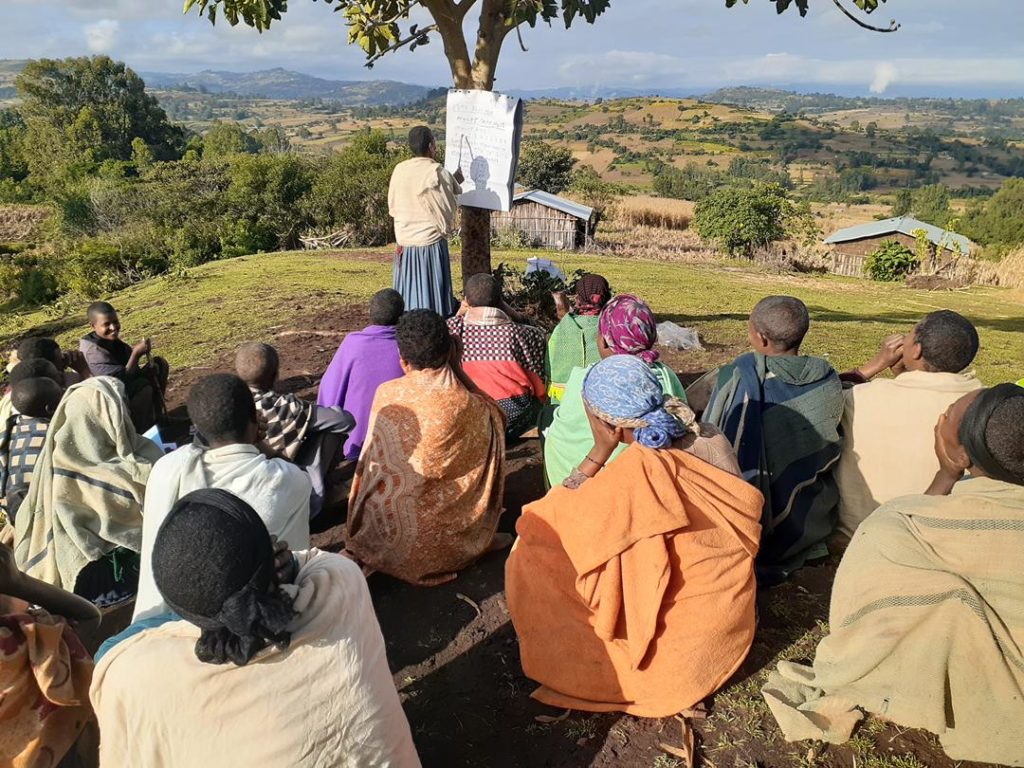Effective Management of a Development Project in Times of Conflict: Communication, Monitoring, and Protection
29 February 2024
In regions often afflicted by conflict, development projects play a crucial role in fostering long-term stability. However, implementing such projects within hostile environments requires a strategic approach and meticulous management. This article underscores the importance of communication with local partners, monitoring conflict dynamics, and safeguarding beneficiaries in the supervision of such projects.

Caption: Community Learning Forums with the local community of the project area in Amhara, Ethiopia.
Mercy Hands Europe, committed to implementing development and humanitarian projects in conflict-affected or disaster-stricken areas, undertakes thorough contextual assessments before initiating any new project, carefully examining present risks. Operating in such high-risk areas, the danger of conflict is never to be taken lightly.
In May 2023, Mercy Hands Europe, in collaboration with its local partner, Agri Service Ethiopia, initiated a project aimed at improving livelihoods and empowering women in the Amhara region, Ethiopia, a country often prey to conflict. However, in July 2023, the situation deteriorated as conflict escalated across the area which the project was being implemented in, leading to an intensified armed confrontation following the declaration of a state of emergency on 4 August 2023. This escalation directly endangered the progress of this newly project, jeopardising its future viability shortly after its implementation. In response to this precarious situation, Mercy Hands Europe and Agri Service Ethiopia quickly adapted to the changing circumstances, prioritising the safety of everyone involved.
Confronted with such a scenario, Mercy Hands Europe acknowledges numerous vital factors to consider when conflicts arise in the aftermath of project launches.
- Communication with Local Partners
In the realm of conflict-affected project development, the establishment and sustenance of robust communication channels with local partners emerge as pivotal to the fruition of initiatives. Local entities bring to the table an indispensable understanding of on-the-ground conditions, community needs, and intricate social dynamics. It is through the lens of open, transparent and regular dialogue that a deeper insight into the challenges at the local level is gained, facilitating the identification of viable solutions and the tailoring of strategies to real-time circumstances.
The importance of fostering a trust-based relationship with local partners cannot be overstated. Such a foundation bolsters Mercy Hands Europe’s operational effectiveness, while cementing its legitimacy within communities affected by conflict. Engaging in collaborative problem-solving endeavours, the organisation and its local counterparts can navigate the complexities of the environment to uncover tailored, impactful solutions, thereby steering the project towards achieving its original objectives.
- Monitoring Conflict Dynamics
In a conflict-ridden environment, where security situations can change rapidly, the ability to swiftly pivot strategies becomes indispensable. Vigilant monitoring of conflict dynamics – encompassing regular scrutiny of security incidents, shifts in population movements, and changes in socio-political landscapes – is primordial. This practice enables organisations to recalibrate project strategies promptly, aligning interventions with the ever-changing needs of beneficiaries while mitigating risks for all stakeholders involved, including personnel from local partner organisations. Essentially, the commitment to dynamic monitoring transcends merely reacting to immediate challenges; it involves proactively shaping responses to ensure effective project management and uphold the safety and integrity of the mission amidst complex and volatile environments.
- Importance of Beneficiary and Staff Protection
In the challenging landscapes of conflict zones where Mercy Hands Europe operates, safeguarding the welfare of beneficiaries and local partner staff members remains fundamental. These areas, marked by instability, expose communities to a multitude of threats, including violence, discrimination, exploitation, and displacement. Navigating the complexities of conflict necessitates an unwavering commitment to ensuring the safety and dignity of all individuals involved. Addressing these challenges requires the integration of protective measures into every facet of project management, conscientiously avoiding actions that may jeopardise the well-being of those served. Amidst the security challenges faced by Mercy Hands Europe’s project in Ethiopia due to the conflict, measures such as suspending activities that require group gatherings and prioritising activities that can be safely conducted at each beneficiary’s residence are implemented. Through proactive efforts to avert potential harm and adapt to unforeseen challenges, the organisation not only prioritises the security of its beneficiaries and local partners’ staff members but also emphasises its core objective: to uphold their safety and dignity against the backdrop of conflict. This vigilant approach underscores the dedication to achieving project outcomes while protecting and enhancing the lives of those in vulnerable situations.
In conclusion, effective management of a development project in times of conflict relies on close communication with local partners, rigorous monitoring of conflict dynamics, and proactive beneficiary protection. By adopting a holistic approach centred on the nuanced needs of communities, Mercy Hands Europe, and humanitarian organisations in general, can maximise their impact and contribute to building sustainable peace in conflict-affected regions.
Célia Thibout
Project Manager at Mercy Hands Europe

